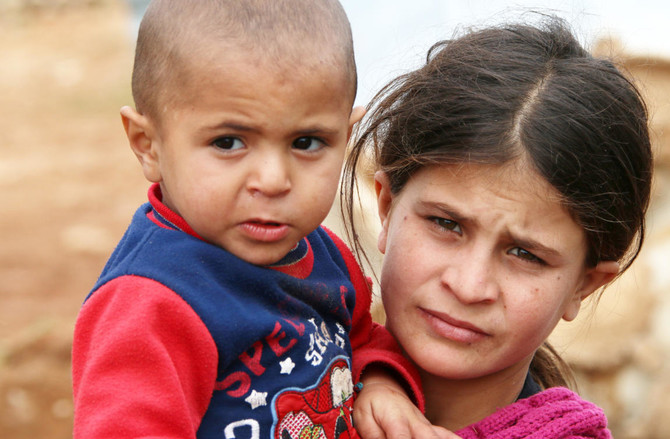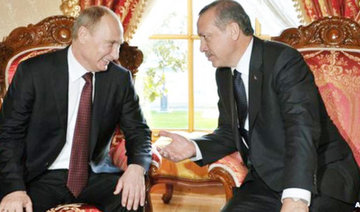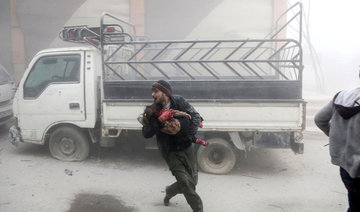BEKAA VALLEY: As 17-year-old Aziza sat in her dark tent in a refugee camp, she rocked her baby while her tiny hands adjusted his pacifier, looking down at all she had left from two broken marriages.
Aziza’s parents arranged for her to marry her cousin when she was 14. Her mother, Rashida, said it was normal for girls her age to become brides in their Syrian tribe as it protected them from harassment and reduced pressure on the family budget.
“I regret that I got married,” Aziza, who declined to give her full name, told the Thomson Reuters Foundation as her eyes welled up with tears.
“The girls that are my age are now studying. They have ambition. I have nothing. I am totally destroyed.”
A growing number of girls among the 1.5 million Syrian refugees who have fled to Lebanon since 2011 are becoming wives amid rising poverty, aid groups said on the eighth anniversary of the conflict.
Around one in five Syrian girls aged between 15 and 19 in Lebanon is married, according to the UN children’s agency (UNICEF), which fears more young girls will be married off by families that cannot afford food, rent and medicines.
More than three quarters of the refugees in Lebanon are living below the poverty line and struggling to survive on less than $4 per day, UNICEF said.
Kafa, a local rights group, is calling on Lebanon to pass a law to make 18 the minimum age for marriage.
There is no minimum age of marriage in Lebanon. Religious communities’ personal status laws can allow girls younger than 15 to marry, according to Human Rights Watch.
The rights group said Lebanon is behind many other countries in the region that have set 18 as the minimum marriage age, including Algeria, Egypt, Iraq, Jordan, Libya, Morocco, Oman, Tunisia and the UAE.
“It is escalating ... because they are living in a very closed community,” said Salwa Al Homsi, a spokeswoman for Kafa.
“The parents, they cannot afford to support their children.”
Aziza lives with her mother, father and five siblings in a small tent covered in plastic sheets in eastern Lebanon’s fertile Bekaa Valley — home to more than 300,000 refugees, the most densely populated area of refugees in Lebanon.
They escaped their hometown of Aleppo five years ago.
“My life in Syria was beautiful,” said Aziza, whose small-frame and adolescent features make her look younger than her years — a striking image of a child holding a child.
“I used to go to school ... and wanted to be a doctor,” said Aziza whose favorite subject was Arabic.
Her father and two of her sisters earn about 6,000 Lebanese pounds ($4) a day, picking grapes and potatoes seasonally.
“I have four daughters, I can’t give them everything they need,” said Rashida, adding that poverty was one reason they decided that Aziza should marry her 17-year-old cousin.
Aziza said she did not oppose the marriage at first, but she divorced after one year because of troubles with her mother-in-law and moved back into her parents’ tent.
When other refugees in her community started to “gossip” about her because she was divorced, she said the shame drove her into a second marriage, aged 16, to a 30-year-old Syrian man.
“I didn’t like him. I only married him because people were talking,” she said from inside her family’s tent.
Aziza said she left the man after about a year because he physically abused her. “The younger a girl gets married, the more at risk she is of domestic violence,” said Jihane Latrous, a UNICEF child protection specialist.
“It is an extremely worrying factor because they aren’t able to deal with such situations.”
Nearly 35 percent of women aged 20 to 24 in Western Bekaa surveyed in 2016 were married before reaching 18, according to the UN Population Fund (UNFPA).
Beyond setting a minimum age for marriage, education of girls is key to break the cycle of poverty, said Latrous.
“The less this young generation is educated, the less they are able, themselves, to bring up their children in a way that will empower their children,” she said.
As the oldest girl in her family, Aziza was adamant that her sisters learn from how she “suffered” and do not marry until they are 20 or older.
“Don’t get married and finish school,” is her message to fellow Syrian refugee girls.
As Aziza looked down at her five-month-old son, she imagined a better life for him.
“When he gets older, I want him to be educated and not be like me, not knowing how to read and write. I want him to know Arabic and English,” she said with a smile.


‘I have nothing’ cries Syrian child bride as poverty drives more refugee girls to wed
‘I have nothing’ cries Syrian child bride as poverty drives more refugee girls to wed

Freezing rain floods Gaza camps

- Over the weekend, tents in Khan Younis were soaked, leaving families struggling to stay dry
- At least 12 people have died from hypothermia or building collapses since December 13
KHAN YOUNIS, Gaza: Rain lashed the Gaza Strip over the weekend, flooding makeshift encampments with ankle-deep puddles as Palestinians displaced by the two-year war attempted to stay dry in tents frayed by months of use.
Muddy water soaked blankets and mattresses in tents in a camp in Khan Younis and fragile shelters were propped up with old pieces of wood. Children wearing flip-flops and light clothing ill-suited for winter waded through the freezing puddles, which turned dirt roads into rivers. Some people used shovels to try to push the water out of their tents.
Nowhere to escape the rain
“We drowned last night,” said Majdoleen Tarabein, a woman displaced from Rafah in southern Gaza. “Puddles formed, and there was a bad smell. The tent flew away. We don’t know what to do or where to go.”
She showed blankets and the remaining contents of the tent, completely soaked and covered in mud, as she and family members tried to wring them dry by hand.
“When we woke up in the morning, we found that the water had entered the tent,” said Eman Abu Riziq, also displaced in Khan Younis, as she pointed to a puddle just outside. “These are the mattresses — they are all completely soaked. My daughters’ belongings were soaked. The water is entering from here and there,” she said, gesturing toward the ceiling and the corners of the tent. Her family is still reeling from her husband’s recent death, and the constant struggle to stay dry in the winter rains.
At least 12 people, including a 2-week-old infant, have died since Dec. 13 from hypothermia or weather-related collapses of war-damaged homes, according to Gaza’s Health Ministry, part of the Hamas-run government.
Emergency workers warned people not to stay in damaged buildings because they could collapse at any moment. But so much of the territory reduced to rubble, there are few places to escape the rain. In July, the United Nations Satellite Center estimated that almost 80 percent of the buildings in Gaza have been destroyed or damaged.
Since a ceasefire between Israel and Hamas went into effect on Oct. 11, 414 people have been killed and 1,142 wounded in Gaza, according to the Health Ministry. The overall Palestinian death toll from the war has risen to at least 71,266. The ministry, which does not distinguish between militants and civilians in its count, is staffed by medical professionals and maintains detailed records viewed as generally reliable by the international community.
More shelter desperately needed in Gaza as aid falls short
Aid deliveries into Gaza are falling far short of the amount called for under the US-brokered ceasefire, according to an Associated Press analysis of the Israeli military’s figures. The Israeli military body in charge of humanitarian aid said in the past week that 4,200 trucks full of humanitarian aid entered Gaza, plus eight garbage trucks to assist with sanitation, as well as tents and winter clothing as part of the winterization efforts. But it refused to elaborate on the number of tents. Humanitarian aid groups have said the need far outstrips the number of tents that have entered.
Since the ceasefire began, approximately 72,000 tents and 403,000 tarps have entered, according to the Shelter Cluster, an international coalition of aid providers led by the Norwegian Refugee Council.
“Harsh winter weather is compounding more than two years of suffering. People in Gaza are surviving in flimsy, waterlogged tents and among ruins. There is nothing inevitable about this. Aid supplies are not being allowed in at the scale required,” Philippe Lazzarini, the commissioner-general of the top UN group overseeing aid in Gaza, wrote on X.
Netanyahu travels to Washington for talks about second stage of ceasefire
Israeli Prime Minister Benjamin Netanyahu traveled to Washington to meet with US President Donald Trump in Florida about the second stage of the ceasefire. Netanyahu is expected to meet with Trump at Mar-a-Lago on Monday.
Though the ceasefire agreement has mostly held over the past 2 1/2 months, its progress has slowed. Israel has said it refuses to move on to the next stage of the ceasefire while the remains of the final hostage killed in the attack on Oct. 7, 2023, that sparked the war are still in Gaza. Challenges in the next phase of the ceasefire include the deployment of an international stabilization force, a technocratic governing body for Gaza, the disarmament of Hamas and further Israeli troop withdrawals from the territory.
Both Israel and Hamas have accused each other of truce violations.
Muddy water soaked blankets and mattresses in tents in a camp in Khan Younis and fragile shelters were propped up with old pieces of wood. Children wearing flip-flops and light clothing ill-suited for winter waded through the freezing puddles, which turned dirt roads into rivers. Some people used shovels to try to push the water out of their tents.
Nowhere to escape the rain
“We drowned last night,” said Majdoleen Tarabein, a woman displaced from Rafah in southern Gaza. “Puddles formed, and there was a bad smell. The tent flew away. We don’t know what to do or where to go.”
She showed blankets and the remaining contents of the tent, completely soaked and covered in mud, as she and family members tried to wring them dry by hand.
“When we woke up in the morning, we found that the water had entered the tent,” said Eman Abu Riziq, also displaced in Khan Younis, as she pointed to a puddle just outside. “These are the mattresses — they are all completely soaked. My daughters’ belongings were soaked. The water is entering from here and there,” she said, gesturing toward the ceiling and the corners of the tent. Her family is still reeling from her husband’s recent death, and the constant struggle to stay dry in the winter rains.
At least 12 people, including a 2-week-old infant, have died since Dec. 13 from hypothermia or weather-related collapses of war-damaged homes, according to Gaza’s Health Ministry, part of the Hamas-run government.
Emergency workers warned people not to stay in damaged buildings because they could collapse at any moment. But so much of the territory reduced to rubble, there are few places to escape the rain. In July, the United Nations Satellite Center estimated that almost 80 percent of the buildings in Gaza have been destroyed or damaged.
Since a ceasefire between Israel and Hamas went into effect on Oct. 11, 414 people have been killed and 1,142 wounded in Gaza, according to the Health Ministry. The overall Palestinian death toll from the war has risen to at least 71,266. The ministry, which does not distinguish between militants and civilians in its count, is staffed by medical professionals and maintains detailed records viewed as generally reliable by the international community.
More shelter desperately needed in Gaza as aid falls short
Aid deliveries into Gaza are falling far short of the amount called for under the US-brokered ceasefire, according to an Associated Press analysis of the Israeli military’s figures. The Israeli military body in charge of humanitarian aid said in the past week that 4,200 trucks full of humanitarian aid entered Gaza, plus eight garbage trucks to assist with sanitation, as well as tents and winter clothing as part of the winterization efforts. But it refused to elaborate on the number of tents. Humanitarian aid groups have said the need far outstrips the number of tents that have entered.
Since the ceasefire began, approximately 72,000 tents and 403,000 tarps have entered, according to the Shelter Cluster, an international coalition of aid providers led by the Norwegian Refugee Council.
“Harsh winter weather is compounding more than two years of suffering. People in Gaza are surviving in flimsy, waterlogged tents and among ruins. There is nothing inevitable about this. Aid supplies are not being allowed in at the scale required,” Philippe Lazzarini, the commissioner-general of the top UN group overseeing aid in Gaza, wrote on X.
Netanyahu travels to Washington for talks about second stage of ceasefire
Israeli Prime Minister Benjamin Netanyahu traveled to Washington to meet with US President Donald Trump in Florida about the second stage of the ceasefire. Netanyahu is expected to meet with Trump at Mar-a-Lago on Monday.
Though the ceasefire agreement has mostly held over the past 2 1/2 months, its progress has slowed. Israel has said it refuses to move on to the next stage of the ceasefire while the remains of the final hostage killed in the attack on Oct. 7, 2023, that sparked the war are still in Gaza. Challenges in the next phase of the ceasefire include the deployment of an international stabilization force, a technocratic governing body for Gaza, the disarmament of Hamas and further Israeli troop withdrawals from the territory.
Both Israel and Hamas have accused each other of truce violations.
© 2025 SAUDI RESEARCH & PUBLISHING COMPANY, All Rights Reserved And subject to Terms of Use Agreement.











